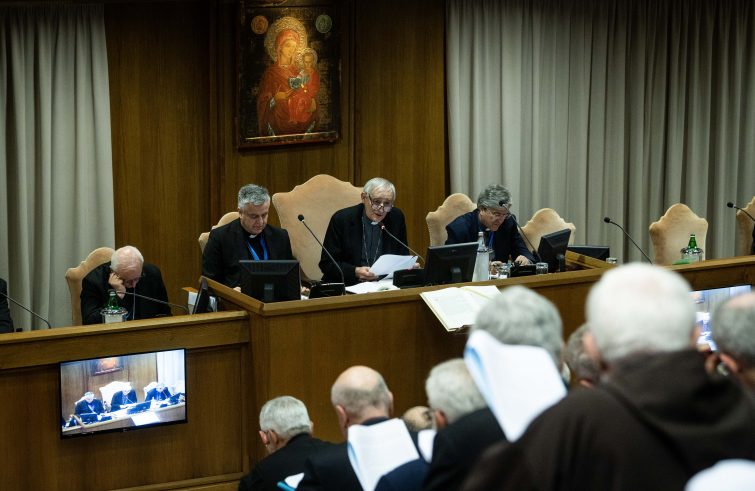
“We will not live a culture of decadence.” Cardinal Matteo Zuppi, Archbishop of Bologna and President of the Italian Episcopal Conference, in his opening address to participants in the 79th General Assembly of the Italian Bishops, which is taking place in the Vatican until 23rd May, outlined the way forward in response to the current challenges facing the country, whose “state of health” is a cause for “concern.” Poverty, which has become a “structural phenomenon”, the demographic winter, the responsibility of welcoming, which has been undermined by the risk of abuse and non-compliance with the law, along with the need for a more fruitful relationship with the world of culture, were the issues highlighted on the domestic agenda. The President of the Italian Bishops’ Conference described the international scenario as
a Babel “marked by widespread suffering by the shadow of interminable, anguishing wars.”
The President of the Italian Episcopal Conference announced that the concluding phase of the Synodal Way, dedicated to prophecy, will have a special focus on the search for spirituality among young people, who will also be protagonists of the upcoming Social Week of Italian Catholics, to be held in Trieste from 3 to 7 July, with the participation of Pope Francis and Italian President Sergio Mattarella.
“Words of thanks” from the Pope. Pope Francis “thanked us for our affection and for our prayers,” said Zuppi. One of the Pope’s recommendations to the Italian Episcopal Conference was: “To discuss problems with realism, without negativity, always filled with the Spirit who delivers us from fear and from the temptation to rely more on ourselves than on the Holy Grace.” For the Cardinal, this is “the optimal way to reflect on Italy as we approach the Jubilee, which requires us to be pilgrims of hope, able to contemplate with love the many difficulties and sufferings of our beloved country,” he said.
The Synodal Way. “Continue walking together; be united in the Church; be a Church whose doors are open to all”. These were the Pope’s three recommendations for the Synodal Way of the Italian Church. “Walking brings us into close contact with reality, which may sometimes appear confused, impenetrable, distant, purely materialistic,” said Zuppi: “On the contrary, reality is always accompanied by suffering, vulnerability, spiritual needs to be discerned, longing for truth.” The third stage of the Synodal Way, marked by the “vitality” of the local Churches, is dedicated to prophecy. “Prophets live through time, interpreting it carefully,” the Cardinal stressed: “We want to translate the fruits we have reaped in recent years into evangelical options and choices, aware of the responsibility for the decisions that lie ahead.”
Poverty and demographic winter. Commenting on the worrying situation in Italy, where poverty has become a “structural phenomenon”, the President of the Italian Bishops’ Conference said that “9.8% of the overall population, or one in ten Italians, live in conditions of absolute poverty”, with 5.752 million inhabitants in extreme poverty, including more than 2 million 234 thousand families. In addition, more than 13 million people are at risk of poverty and/or social exclusion, representing 22.8% of the overall population, which is higher than the European average. These figures do not include chronic and intermittent poverty or the widening generation gap.
“We will not live in a decadent culture that keeps us inward-looking, prevents us from acting boldly and deprives us of hope,” the Cardinal said, appealing against resignation. The demographic winter “requires forward-looking initiatives” because “we must not withdraw from life.”
Reception and hinterland. On the reception side, “solidarity measures must be promoted. It is urgent to identify inclusive and truly effective responses that will strengthen the sense of community and mutual care, so that no one is excluded or left behind.” “These problems have been greatly exacerbated in the hinterland areas of the country, which remain a source of great concern for the Church,” the Cardinal continued. ” However, if properly and strategically supported, these areas have the potential to become areas of welcome for all, even in terms of emigration, which should be both an opportunity and a necessity”, the Cardinal pointed out. “This form of welcome opens our hearts and testifies to a renewed culture of peace,” said Zuppi: “It is precisely in this spirit that we will welcome minors from Ukraine to spend a summer of solidarity.” Seven of our local Churches, together with lay associations, have offered to host 700 minors”. “A clear and effective legal framework is also needed to combat abuses, to guarantee rights and duties, and to respond, among other things, to a demand for labour that in some cases becomes a real emergency”, declared the President of the Italian Bishops’ Conference.
Faith and culture. In his concluding remarks, the Cardinal sounded a clear warning: “Without relations with the world of culture the Church risks being cut off also from the social world, which today is much more knowledgeable and learned than it was in the first half of the 20th century”. “Despite the originality and determination of Pope Francis, we should ask ourselves if we are perhaps succumbing to timidity, failing to display creative imagination in the cultural sphere,” said Cardinal Zuppi, adding that “a Church that is not culturally engaged and imaginative suffers from a glaring and serious shortcoming and omission, in other words, it fails to lend vitality and timeliness to the Christian message.” “The Church must facilitate the critical analysis of prevailing ideologies, myths, lifestyles, ethics and aesthetics”, the President of the Italian Episcopal Conference suggested: “If it is true that the Church needs culture, let me add that it is also culture that needs the Christian perspective”.









